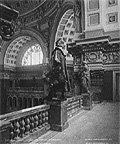Citation Information for “Thomas Aquinas,
‘The Argument from Efficient Cause’”
Philosophy of Religion
October 12 2025 04:04 EDT

Gallery of the Rotunda,
Library of Congress,
LC-D4-13499
Citation Information for “Thomas Aquinas,
‘The Argument
from Efficient Cause’”
This page is not intended to be original or authoritative. The page is a summary of some main points and associated notes on the topic. Undoubtedly, there are scholarly and authoritative sources, both primary and secondary which ought be cited rather than these notes.
However if you find the page of use, your citation should meet the style requirements of the publication for which you are submitting your paper. In general, the current page may be cited in this manner:
Archie, Lee C, "Thomas Aquinas, ‘The Argument from Efficient Cause,’" Philosophy of Religion (June 26, 2006) URL=<http://philosophy.lander.edu/intro/cause.shtml>.
“These deceptive principles I shall merely enumerate … We find, for instance, (1) the transcendental principle whereby from the contingent we infer a cause. This principle is applicable only in the sensible world; outside that world it has no meaning whatsoever. For the mere intellectual concept of the contingent cannot give rise to any synthetic proposition, such as that of causality. The principle of causality has no meaning and no criterion for its application save only in the sensible world. (2) The inference to a first cause, from the impossibility of an infinite series of causes, given one after the other, in the sensible world. The principles of the employment of reason do not justify this conclusion even within the world of experience, still less beyond this world in a realm into which this series can never be extended. (3) The unjustified self-satisfaction of reason in respect of the completion of this series. The removal of all the conditions without which no concept of necessity is possible is taken by reason to be a completion of the concept of the series, on the ground that we can then conceive nothing further. (4) The confusion between the logical possibility of a concept of all reality united into one (without inner contradiction) and the transcendental possibility of such a reality. In the case of the latter there is needed a principle to establish the practicability of such a synthesis, a principle which itself, however, can apply only to the field of possible experiences—etc.”
Immanuel Kant, The Critique of Pure Reason, trans. Norman Kemp Smith (New York: St Martin's Press, 1965) (A610/B638), 511-512.
Relay corrections or suggestions to philhelp@gmail
Read the disclaimer concerning this page.
1997-2025 Licensed under GFDL and Creative Commons 3.0


The “Copyleft” copyright assures the user the freedom to use,
copy, redistribute, make modifications with the same terms.
Works for sale must link to a free copy.
The “Creative Commons” copyright assures the user the freedom
to copy, distribute, display, and modify on the same terms.
Works for sale must link to a free copy.


